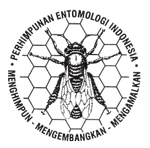Keefektivan Beauveria bassiana (Bals.) Vuill. isolat Indigenous pagaralam sumatera selatan pada media beras terhadap larva Plutella xylostella Linn. (Lepidoptera: Yponomeutidae)
DOI:
https://doi.org/10.5994/jei.3.1.30Keywords:
Effectivity, Plutella xylostella, Beauveria bassiana, LT50Abstract
The objective of study was to investigate the effectiveness of Beauveria bassiana isolate cultured in half-ripe rice media against third-instar larvae of Plutella xylostella. The research used 10 isolates consisted of 4 isolates that were originnally collected from Pagaralam i.e. PD1 (isolated from P. xylostella cadaver), PD2, PD8, PD9B (from Crysodeixis chalcites cadaver), and 6 isolates from other areas as comparison, i.e. CCW3 (from Crysodeixis chalcites cadaver), BBL (from Hypothenemus hampei cadaver), CH (from Conomorpha cramerella cadaver), CPJW (from H. hampei cadavi), WC (from Nilaparvata lugens cadaver), and WSJT (from Leptocorixa acuta cadaver). The parameters that were measured were mortality of larvae, time of death and behaviour of larvae after application. Result of the test showed that B. bassiana isolated from L. acuta (WSJT isolate) caused the highest mortality i.e. 73.34 %, with the highest spore density 5.6x107 spore ml-1 (in half-rice media) and 3.0x107 spore ml-1 (GYA media). The lowest LT50 was 19.27 hours, and was obtained from the application of PD9B. After application of B. bassiana, the behaviour of larvae was slightly change from a healthy one to less in consuming of food and then die.Downloads
Downloads
Published
How to Cite
Issue
Section
License
Authors who publish with this journal agree to the following terms:
- Authors retain copyright and grant the journal right of first publication with the work simultaneously licensed under a Creative Commons Attribution 4.0 International License that allows others to share the work with an acknowledgement of the work's authorship and initial publication in this journal.
- Authors are able to enter into separate, additional contractual arrangements for the non-exclusive distribution of the journal's published version of the work (e.g., post it to an institutional repository or publish it in a book), with an acknowledgement of its initial publication in this journal.
- Authors are permitted and encouraged to post their work online (e.g., in institutional repositories or on their website) prior to and during the submission process, as it can lead to productive exchanges, as well as earlier and greater citation of published work (See The Effect of Open Access).








